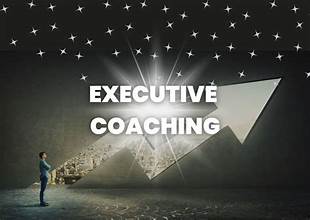Executive Coaching: Unleashing Leadership Potential in a Turbulent World

• Enhanced Self-Awareness: Executive coaching fosters self-awareness in leaders through assessments and reflective practices, forming a foundation for meaningful growth.
• Improved Communication and Emotional Intelligence: Coaching nurtures effective communication and emotional intelligence, leading to better relationships and a cohesive organizational culture.
• Broad Applicability Across Career Stages: Executive coaching benefits individuals at all levels, from emerging leaders to seasoned executives, driving positive change throughout the organization.
In the present world of rapid movement and complexity, executive coaching has emerged as the cornerstone for leadership development. It is a personal approach towards professional development with the purpose of “improving the leader’s capability, approach, and psychology to produce outcomes relevant to both individual and organizational success”. Service providers like the Executive Coaching by The Human Space offer tailored solutions that help leaders navigate the ever-evolving challenges of their roles. Although specific coaching providers are crucial, this article will look into and explore in detail the aspects relating to executive coaching as a change process that benefits leaders across different spectrums.
What is Executive Coaching?
In essence, executive coaching deals with a collaborative and results-oriented relationship between the coach and senior leaders. While most traditional training programs tend to take on a one-size-fits-all approach, executive coaching is very individualized in solving the peculiar needs, goals, and leadership context an individual may have.
The coach acts as a partner in providing guidance, feedback, and tools that facilitate enhanced performance by the leader, better decision-making, and the building of useful relationships. Focusing both on the behavioral and strategic perspectives, executive coaching enables leaders to achieve non-enduring growth and surmount different challenges.
Why Executive Coaching Matters
Leaders hold responsibility positions, trickling down from the teams and organizations to even large-scale industries. Executive coaching helps these executives in critical areas of their normal work life, including communication, emotional intelligence, strategic vision, and adaptability.
Organizations investing in executive coaching often see huge returns in improved leadership effectiveness, higher employee engagement, and better overall performance. Moreover, the ripple effect of one well-coached executive can stir positive change across the entire organization.
Key Benefits of Executive Coaching
1. Developing Self-Awareness
Among the key benefits of executive coaching is the growth of self-awareness. Assessments and reflective practices help leaders develop much awareness of strengths, blind spots, and behavior patterns. This forms the foundation for meaningful growth.
2. Effective Communication and Influence
Great leadership is all about effectively communicating vision and inspiration among teams, resolving or managing conflicts. Executive coaching, therefore, nurtures these aspects in a leader. This leads to better relations with a more cohesive organizational culture.
3. Increased Emotional Intelligence
The ability of emotional intelligence-or EQ-is one that involves recognizing and regulating one’s emotions while understanding and influencing others. Coaching enhances the EQ of leaders to manage such complex interpersonal dynamics and brings in leadership charged with much empathy and composure.
4. Sharper Decision-Making Skills
Leaders often have to make high-level decisions that require both a dose of analytical rigor and intuitive insight. Executive coaching sharpens the processes leaders use to make decisions, aligning them with organizational goals and values.
5. Adaptability and Resilience
The business landscape continuously changes. In such an environment, executive coaching helps executives be more flexible, innovative, and perform under pressure.
Who Benefits from Executive Coaching?
Coaching for executives isn’t restricted to CEOs or senior executives alone, though this may be where the greater rewards often take place. Other stages include:
Emerging Leaders: Those individuals now moving into an executive position can make use of coaching to build confidence and develop the competencies required for effective leadership.
• Mid-Level Managers: Coaching helps them to bridge the gap between operational responsibilities and strategic thinking and prepares their grounds for more substantial leadership opportunities.
•.Top Leaders and Executives: Even the seasoned leadership benefits from coaching as it brings new perspectives, continuous learning, and approaches to addressing evolving challenges.
How It Works: In general, executive coaching starts with the assessment phase in which both the coach and leader identify strengths, weaknesses, and areas for development. These may include personality assessments, 360-degree feedback, and in-depth discussions.
Based on such insight, the coach and the leader collectively create a development plan with specific, measurable goals. The regular coaching sessions are then centered on the attainment of these objectives. A coach would provide feedback, guidance, and accountability.
Good coaching results in a very real transfer of material to on-the-job application: leaders apply new skills and behaviors at work; the impact is immediate and tangible.
Finding the Right Executive Coach
Choosing the right coach will determine whether or not the coaching journey will be successful. To decide, consider the following :
Experience and Expertise: A coach who has a good background of providing executive coaching services and is familiar with the industry in which the leader operates can advise him better.
Coaching Style: There are different types of coaches-one would focus on changing behavior, while the other would emphasize strategic thinking. Whatever best suits his goals and liking, the leader has to decide.
Rapport and Trust: Much of the relationship in coaching emanates from trust, which emanates from open communications. A good coach ensures honest dialogue by creating a safe space that encourages constructive feedback.
The Broader Impact of Executive Coaching
The outcomes of executive coaching extend beyond their target-the individual leader. In bringing out better and more effective leadership, coaching creates a healthy organizational culture characterized by more satisfied employees and good business performance.
Take, for example, providers like The Human Space, who have made certain their coaching programs answer the needs of modern leaders. Providers like them alone could show just how powerful coaching can be: not just shaping individual leadership but within the teams and businesses they lead.
Conclusion
Executive coaching is a very powerful key to unlocking full leadership potential in this increasingly complex and dynamic world. Coaching nurtures and develops self-awareness, amplifies the level of critical competencies, and enables agile behaviors that empower leaders to address challenges, inspire their teams, and secure long-term success.
While the demand for strong leadership continues to rise across the globe, executive coaching is no longer an advantage but a strategic necessity. Whatever one’s level-from rising leader to seasoned executive-the right coaching partnership can be just what they need to reignite personal growth and organizational impact.

Source: Executive Coaching: Unleashing Leadership Potential in a Turbulent World




